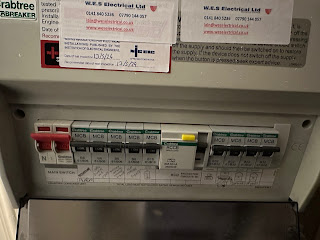Finding a reliable and skilled electrician in the Southside of Glasgow, including Mosspark and surrounding areas, is essential for both homeowners and landlords. Whether you need an Electrical Installation Condition Report (EICR), a full rewire, or a completion certificate for a property conversion, it’s crucial to work with qualified professionals who understand local regulations and safety standards.
Why Choose a Professional Electrician in the Southside of Glasgow?
The Southside of Glasgow is known for its diverse mix of traditional tenements, 1930s semi-detached homes, and modern developments. With such varied property types, electrical work must be tailored to meet the specific requirements of each building. A professional electrician ensures:
Compliance with BS 7671 Wiring Regulations
Certification for all work carried out
Safety and efficiency in every project
Long-term reliability of electrical systems
Services Offered by Electricians in Southside Glasgow
1. Landlord Electrical Certificates in Glasgow
Landlords in Glasgow are legally required to ensure their rental properties meet electrical safety standards. The key certificates include:
EICR Glasgow (Electrical Installation Condition Report)
An EICR in Glasgow is a vital document that assesses the condition of electrical installations within a property. Landlords must obtain this certificate every five years to remain compliant with Scottish rental regulations.
PAT Testing (Portable Appliance Testing)
Landlords must also ensure that electrical appliances provided in furnished rental properties are safe. PAT testing ensures items like kettles, microwaves, and washing machines are in good working order.
EPC Certificate in Glasgow
Though not directly related to electrical work, an Energy Performance Certificate (EPC) is often required alongside electrical inspections. It provides a rating of the property’s energy efficiency, which landlords must present to new tenants.
2. Full & Partial Electrical Rewires in Glasgow
Older properties, particularly those in areas like Shawlands, Mosspark, and Pollokshields, may require a full or partial rewire. If a property still uses old wiring methods like rubber or lead-insulated cables, a full rewire is strongly recommended.
Signs You Need a Rewire:
Frequent blown fuses or tripped circuits
Dated wiring (older than 30 years)
No RCD protection in the fuse board
Burning smells from sockets or switches
A full rewire involves replacing all electrical wiring, sockets, and switches, ensuring the property is safe, energy-efficient, and compliant with modern standards.
3. Completion Certificates for Conversions
Homeowners who have undertaken property conversions—such as loft conversions, basement renovations, or garage conversions—need a completion certificate before selling or renting their property.
A completion certificate proves that all electrical work has been inspected and complies with Scottish Building Standards. Without it, homeowners may struggle to get approval from solicitors or mortgage lenders during a sale.
Choosing the Right Electrician in Southside Glasgow
With so many electricians operating in Glasgow, selecting the right one is key. Consider the following when hiring an electrician:
Accreditations & Qualifications – Ensure they are NICEIC or SELECT approved.
Experience – Look for electricians familiar with both modern and period properties.
Local Reputation – Check customer reviews and testimonials.
Pricing & Transparency – Request a detailed quote before work begins.
Emergency Electricians in Glasgow’s Southside
Electrical issues can arise unexpectedly, requiring urgent attention. Whether it's a power outage, faulty fuse board, or burning smell from wiring, having access to a 24/7 emergency electrician ensures safety and prevents damage.
Conclusion
Whether you need an EICR in Glasgow, a full rewire, or a completion certificate for a property conversion, hiring a professional electrician is essential. By ensuring compliance with Scottish regulations and prioritizing safety, you can protect your property and tenants while maintaining legal requirements.
For reliable electrical services in Glasgow’s Southside, including Mosspark, contact a fully qualified electrician today.




